New phosphine-diamine and phosphine-amino-alcohol tridentate ligands for ruthenium catalysed enantioselective hydrogenation of ketones and a concise lactone synthesis enabled by asymmetric reduction of cyano-ketones
Abstract
Enantioselective hydrogenation of ketones is a key reaction in organic chemistry. In the past, we have attempted to deal with some unsolved challenges in this arena by introducing chiral tridentate phosphine-diamine/Ru catalysts. New catalysts and new applications are presented here, including the synthesis of phosphine-amino-alcohol P,N,OH ligands derived from (R,S)-1-amino-2-indanol, (S,S)-1-amino-2-indanol and a new chiral P,N,N ligand derived from (R,R)-1,2-diphenylethylenediamine. Ruthenium pre-catalysts of type [RuCl2(L)(DMSO)] were isolated and then examined in the hydrogenation of ketones. While the new P,N,OH ligand based catalysts are poor, the new P,N,N system gives up to 98% e.e. on substrates that do not react at all with most catalysts. A preliminary attempt at realising a new delta lactone synthesis by organocatalytic Michael addition between acetophenone and acrylonitrile, followed by asymmetric hydrogenation of the nitrile functionalised ketone is challenging in part due to the Michael addition chemistry, but also since Noyori pressure hydrogenation catalysts gave massively reduced reactivity relative to their performance for other acetophenone derivatives. The Ru phosphine-diamine system allowed quantitative conversion and around 50% e.e. The product can be converted into a delta lactone by treatment with KOH with complete retention of enantiomeric excess. This approach potentially offers access to this class of chiral molecules in three steps from the extremely cheap building blocks acrylonitrile and methyl-ketones; we encourage researchers to improve on our efforts in this potentially useful but currently flawed process.
Citation
Fuentes García , J A , Phillips , S D & Clarke , M 2012 , ' New phosphine-diamine and phosphine-amino-alcohol tridentate ligands for ruthenium catalysed enantioselective hydrogenation of ketones and a concise lactone synthesis enabled by asymmetric reduction of cyano-ketones ' , Chemistry Central Journal , vol. 6 , 151 . https://doi.org/10.1186/1752-153X-6-151
Publication
Chemistry Central Journal
Status
Peer reviewed
ISSN
1752-153XType
Journal article
Collections
Items in the St Andrews Research Repository are protected by copyright, with all rights reserved, unless otherwise indicated.

